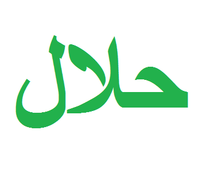Halal
any object or an action which is permissible to use or engage in, according to Islamic law
Halal (Arabic: حلال, romanized: halāl, halaal, ħalāl) is an Islamic Arabic term meaning "permissible". The opposite is "haram", which means "forbidden".


Muslims have strict rules of what they can and cannot eat:
- Animals need to be killed in a special way. The animal must be slaughtered by a Muslim man,[1] and the slaughter must be humane.[2] (The animal should be slaughtered by hand so that all the blood could be drained from the slaughtered {dead} animal before they can eat the animal. It is called "Zabihah Halal" in Arabic language meaning "Permissible Slaughter".)
- Muslims cannot consume carcass animals even the animal slaughtered by knife not in its neck called Mari' and wajadan. Hunting animals can be eaten, but in a special manner.
- Muslims must not eat pork.[3]
- According to the Shafi'i, Maliki and Hanbali branches of Islam, all seafood would be halal except for eels in the Maliki branch (madhab) of Islam and all seafood except for fish in the Hanafi branch of Islam.[4]
- They should not drink alcohol or consume other intoxicating substances in the wrong way (for example, narcotics). All substances that takes away the minds - with no medical purpose- are forbidden.
- Some sources even argue caffeine, like alcohol and drugs, to be haram, which is the full opposite of halal.[5]
References
change- ↑ "Department of Halal Certification EU". Department of Halal Certification EU.
- ↑ [Qur'an 5:3]
- ↑ "Surat Al-Baqarah [2:173] - The Noble Qur'an - القرآن الكريم". legacy.quran.com. Retrieved 2024-05-18.
- ↑ IslamQA (2012-08-02). "Seafood in the four madhab". IslamQA. Retrieved 2024-05-18.
- ↑ "Did You Know Coffee Was Once Punishable by Death in Istanbul?". 23 July 2019.
Wikimedia Commons has media related to Halal.